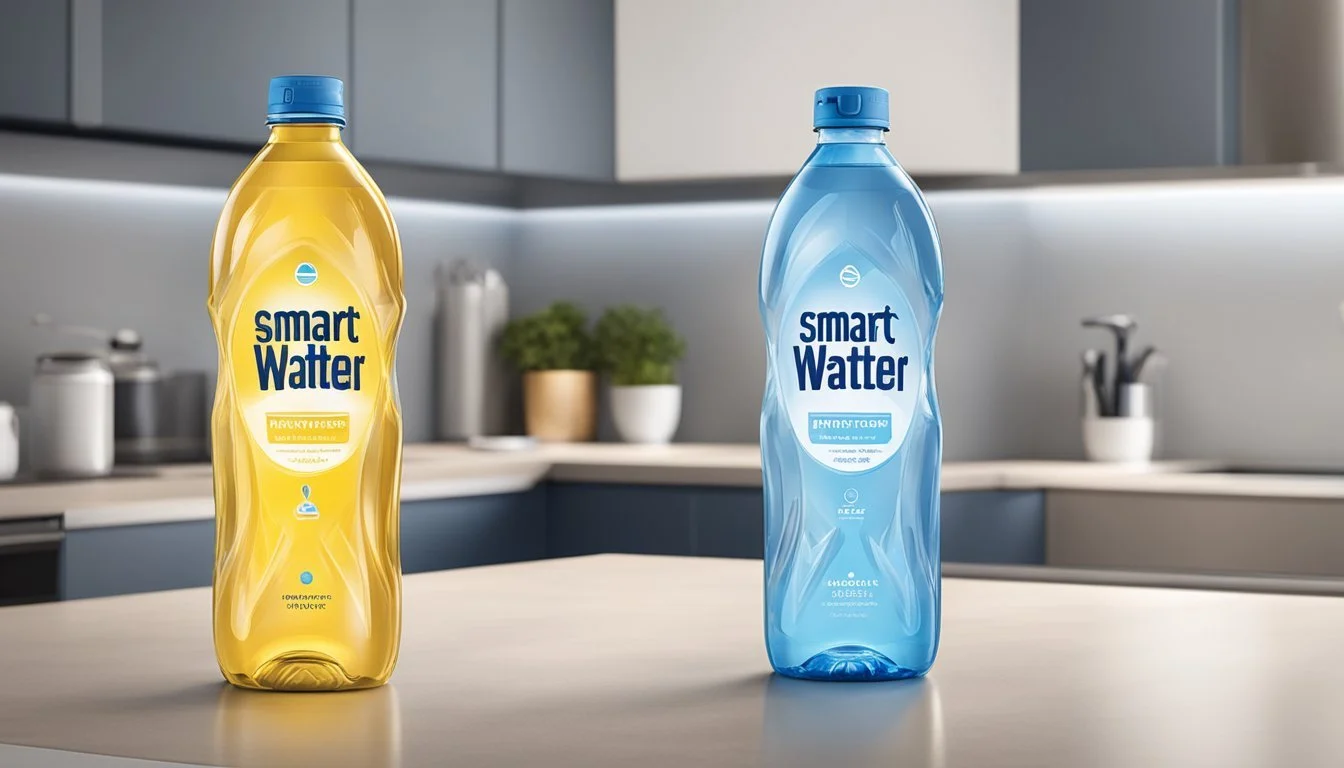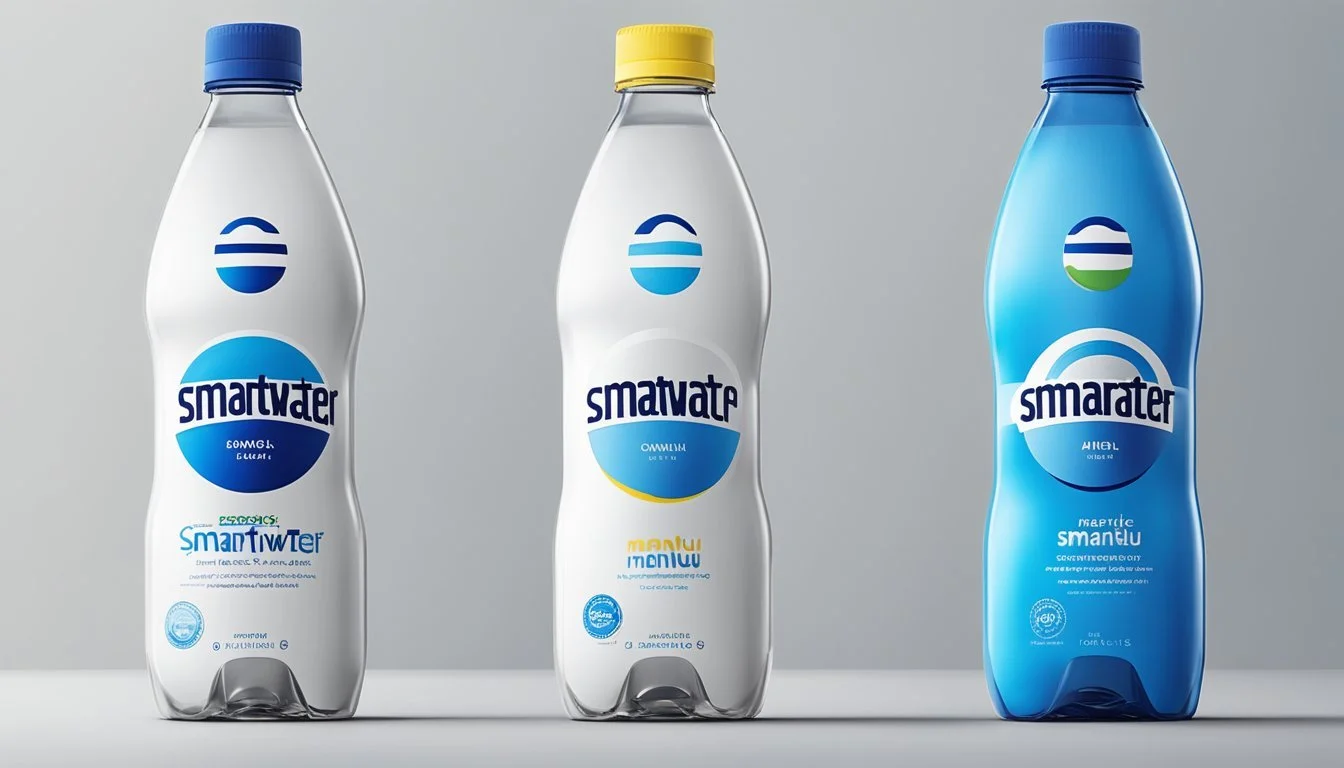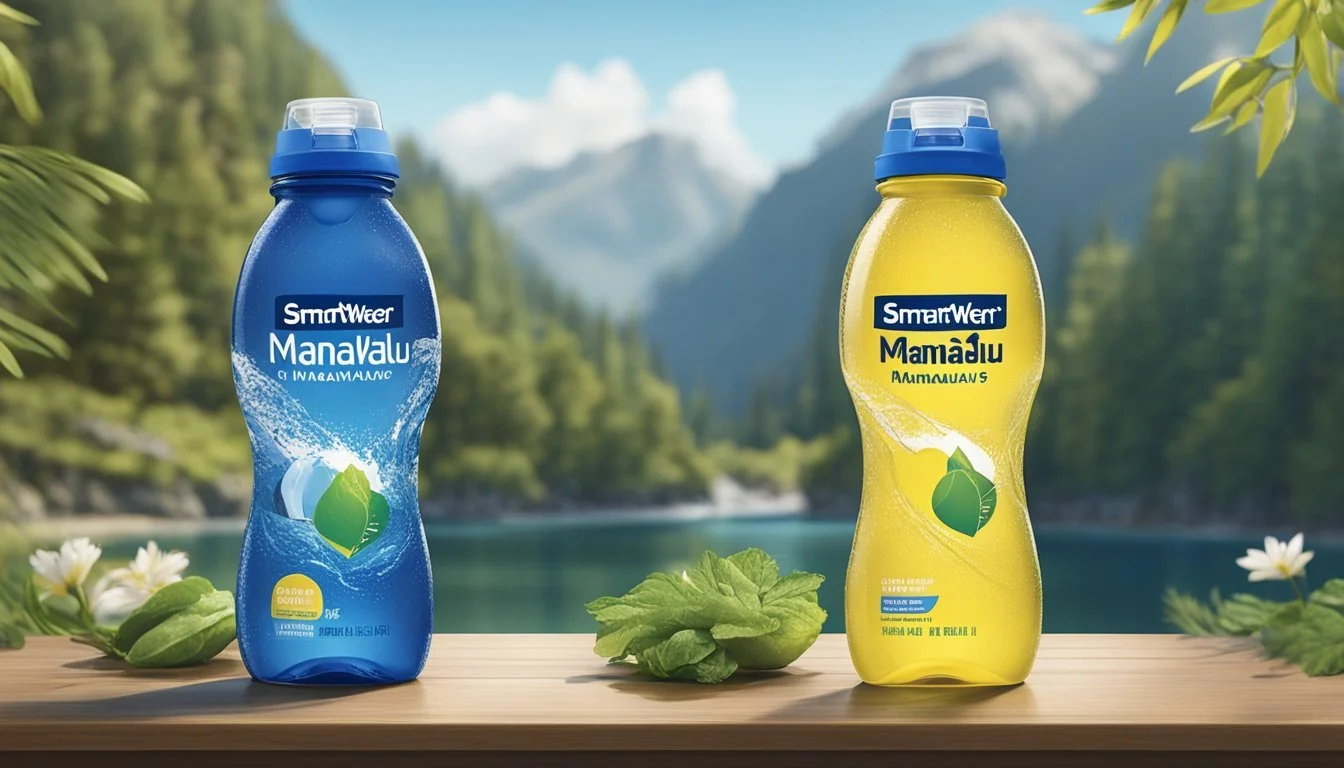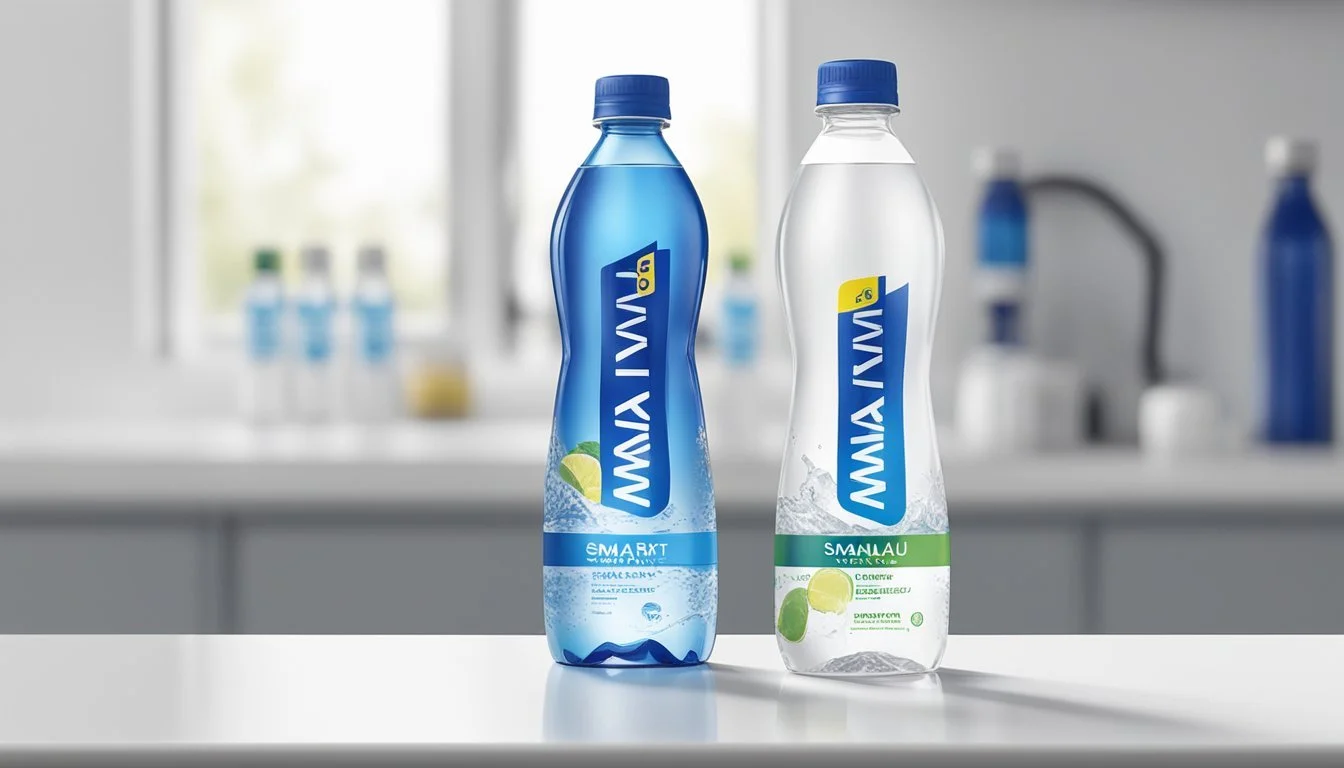Smartwater vs. Mananalu
A Comparative Analysis of Bottled Water Brands
When it comes to choosing between Smartwater and Mananalu, the decision often hinges on personal preference and specific needs. Smartwater, known for its vapor-distilled processing and the addition of electrolytes, offers a clean and crisp taste that appeals to many for its perceived purity and enhanced hydration. Its sleek packaging and reputation for quality make it a popular choice among consumers seeking reliable bottled water.
Mananalu, created by actor Jason Momoa, stands out with its commitment to sustainability and eco-friendly packaging. The water is packaged in 100% recyclable aluminum, positioning it as an environmentally conscious option for those looking to reduce their plastic footprint. Additionally, Mananalu aims to provide a refreshing taste experience sourced from pure water sources, appealing to both taste and ethical considerations.
In the debate of Smartwater vs. Mananalu, it ultimately comes down to weighing the benefits of enhanced hydration and taste provided by Smartwater against the eco-friendly and sustainable packaging of Mananalu. For those prioritizing environmental impact, Mananalu may be the better choice, while those seeking enhanced hydration might favor Smartwater.
What is Bottled Water?
Bottled water refers to drinking water packaged in bottles, typically for individual consumption. Key points focus on its types, quality control, and regulations.
Understanding Bottled Water
Bottled water is marketed for its convenience and portability. It includes water from various sources, processed and purified for safe consumption. It is commonly used to ensure access to clean drinking water.
Water sources can include springs, wells, and municipal supplies. Brands like Fiji Water, Evian, and Dasani offer different taste profiles and mineral content. Consumers often choose based on taste, purity, and brand reputation.
The convenience of bottled water attracts many, despite environmental concerns. It is essential to examine how it is sourced, processed, and regulated.
Categories of Bottled Water
There are several categories of bottled water, each with unique properties and standards:
Spring Water: Sourced from natural springs, often considered pure and mineral-rich. Examples include Poland Spring and Evian.
Purified Water: Water that has been filtered or processed to remove impurities. Aquafina and Dasani fall under this category.
Mineral Water: Contains naturally occurring minerals and elements. Fiji Water and other high-end brands are often mineral waters.
Sparkling Water: Contains dissolved carbon dioxide gas, either naturally occurring or added during bottling. Perrier and San Pellegrino are well-known examples.
Alkaline Water: Has a higher pH level, marketed for health benefits. Essentia and Smartwater Alkaline are popular choices.
Each category caters to different preferences and needs, whether for taste, health benefits, or hydration.
Bottled Water Regulations
Bottled water regulations ensure safety and quality. In the United States, the Food and Drug Administration (FDA) establishes guidelines and standards. These regulations include:
Source protection and management.
Treatment processes to eliminate contaminants.
Labeling requirements for transparency.
Compliance with these regulations ensures bottled water is safe for consumption. Regular testing and quality control measures are mandatory, giving consumers confidence in their purchase.
In addition, various international standards may apply, especially for globally distributed brands like Voss and Evian. Proper regulation adherence is crucial for maintaining product integrity and consumer trust.
The Brand Behind the Bottle
Smartwater and Mananalu bring unique strengths to the bottled water market, each backed by distinct brand narratives and missions. This section delves into their origins, marketing strategies, and the reputation they have built.
Smartwater Overview
Smartwater is a product of Glaceau, a subsidiary of Coca-Cola. Launched in 1996, it quickly became recognized for its vapor-distillation process, which mimics the natural hydrologic cycle.
Key Points:
Origin: Launched by Glaceau, acquired by Coca-Cola in 2007.
Process: Uses vapor distillation to purify water.
Electrolytes Added: Includes electrolytes for taste, such as potassium, calcium, and magnesium.
The marketing emphasizes purity and clarity, often featuring sleek, minimalist bottle designs. Endorsements from celebrities like Jennifer Aniston have bolstered its status as a premium product.
Mananalu Overview
Mananalu was founded by actor Jason Momoa in 2019. The brand's mission targets environmental sustainability by reducing plastic waste.
Key Points:
Founder: Established by Jason Momoa, known for his role in Aquaman.
Packaging: Uses 100% recyclable aluminum cans.
Environmental Focus: Aims to eliminate single-use plastic bottles.
The brand's marketing heavily emphasizes environmental responsibility, with campaigns that align with eco-friendly initiatives. Mananalu is more than just water; it’s a statement against plastic pollution.
Comparative Brand Reputation
Smartwater, backed by Coca-Cola, enjoys a robust market presence and high visibility due to extensive marketing efforts and established distribution channels. Its association with reliability and premium quality appeals to a broad audience.
Mananalu, though newer, has quickly garnered attention for its strong environmental stance. Its reputation benefits from Jason Momoa's celebrity influence and dedication to sustainable practices.
Both brands offer quality products but appeal to different sets of values — one centered on purity and style, the other on reducing environmental impact.
Water Sources and Filtration Methods
Smartwater and Mananalu each have unique approaches to sourcing and purifying their water. Understanding these differences can help consumers make informed choices about which brand aligns best with their preferences.
Sourcing the Water
Smartwater sources its water from municipal supplies. The brand then purifies this water using a multi-step process to ensure it is of the highest quality. This method allows Smartwater to start with a controlled baseline of water quality before undergoing further purification.
Mananalu, on the other hand, focuses on reducing plastic usage by packaging its water in 100% recyclable aluminum cans. The water itself is drawn from various sources depending on the production location. Regardless of the origin, the water is subject to rigorous purification standards to maintain consistent quality.
Filtration and Purification Process
Smartwater utilizes a process known as vapor distillation, similar to the way nature produces rain. The water is heated until it turns into vapor, leaving behind impurities. This vapor is then condensed back into a liquid form. After condensation, Smartwater adds electrolytes, which contribute to its distinct clean taste.
Mananalu employs a comprehensive filtration process that includes reverse osmosis and ultraviolet light treatment. Reverse osmosis helps remove particles, minerals, and impurities. Ultraviolet (UV) light is used to kill bacteria and other microorganisms, ensuring the water is pure and safe to drink.
These meticulous processes underscore the brands' commitment to quality and consumer health.
Nutritional and Health Factors
When comparing Smartwater and Mananalu, it is essential to consider their nutritional content and the health benefits they provide. Key aspects such as added electrolytes, the pH level, and the overall hydration benefits play significant roles in determining which bottled water might better suit individual needs.
Electrolytes and Mineral Additions
Smartwater includes electrolytes like calcium chloride, magnesium chloride, and potassium bicarbonate, which are added for taste. These electrolytes help in maintaining the body's electrolyte balance, promoting efficient muscle function and hydration.
Mananalu, focusing on sustainability, does not typically add electrolytes or minerals artificially. It relies more on the purity of its water source. For those prioritizing natural mineral inclusion without artificial additives, Mananalu may be more appealing.
Element Smartwater Mananalu Calcium Chloride Added for Taste Not Added Magnesium Chloride Added for Taste Not Added Potassium Bicarbonate Added for Taste Not Added Natural Minerals Minimal Due to Purification Present, Minimal Processing
pH Levels and Acidity
Smartwater is known to have a neutral pH, typically around 7, making it neither acidic nor alkaline. This neutrality can be beneficial for those who seek a balanced pH in their drinking water without leaning towards the acid or alkaline side.
Mananalu, depending on its source, can have slightly varying pH levels but generally remains neutral to slightly alkaline. Alkaline water from Mananalu may benefit those looking to neutralize body acidity and support overall wellness.
A neutral pH ensures that the water is not harsh on the stomach and is suitable for regular consumption without affecting body pH balance.
Water Brand pH Level Smartwater ~7 (Neutral) Mananalu Neutral to Slightly Alkaline
Health Benefits of Hydration
Both Smartwater and Mananalu prioritize hydration, which is critical for bodily functions, skin health, and energy levels. Smartwater's added electrolytes may offer extra support to those involved in intense physical activities by replenishing lost minerals due to sweat.
Mananalu advocates for pure hydration without unnecessary additives, appealing to those who prefer water closer to its natural state. This simplicity can be beneficial for those with sensitivities to added minerals or flavors.
Regular consumption of either brand can contribute to adequate daily hydration, promoting kidney function, digestion, and nutrient absorption.
Hydration Aspect Smartwater Mananalu Electrolyte Replenishment Enhanced due to added minerals Dependent on natural mineral content Purity High through vapor distillation High with minimal processing Sensitivities to Additives May not suit those with mineral sensitivities Suitable for those preferring fewer additives
Taste and Quality of Water
This section focuses on the essential aspects of taste and quality for both Smartwater and Mananalu. Each brand prides itself on unique characteristics that make their bottled water stand out.
Flavor Profile and Taste Test
Smartwater is known for its crisp, clean taste. This is achieved through a process of vapor distillation, which involves evaporating water to remove impurities and then condensing it back into liquid form. Many describe Smartwater's flavor as smooth and slightly sweet due to the addition of electrolytes, including calcium chloride, magnesium chloride, and potassium bicarbonate.
In contrast, Mananalu offers a different experience. Sourced and purified in the USA, it is noted for its balanced, neutral flavor. The water is packaged in 22-ounce aluminum bottles, ensuring no plastic taste. Consumers often praise Mananalu's refreshing nature and lack of aftertaste, making it appealing for those who prefer a straightforward, crisp water experience.
Quality Control Measures
Smartwater undergoes rigorous quality control measures. Its vapor distillation process ensures that the water is high-quality and free of contaminants. The addition of electrolytes not only enhances taste but also aligns with consumers' expectations of purified, distilled water. Each batch is tested to maintain consistency and quality.
Mananalu also prioritizes quality. The brand emphasizes its water's alkaline nature, which is believed to offer potential health benefits. Their purification methods ensure that the water meets high standards. Packaged in aluminum, it avoids common concerns related to plastic contamination, ensuring that the quality remains uncompromised.
Both brands' commitment to strict quality control practices underscores their dedication to delivering clean, high-quality bottled water to consumers.
Environmental and Health Considerations
When comparing Smartwater and Mananalu, it's essential to examine the environmental impact and health benefits. The discussion includes plastic bottle usage, steps taken towards sustainability, and potential contaminants present in the water.
Plastic Bottles and BPA Content
Smartwater typically uses plastic bottles, which are convenient but raise concerns about BPA (Bisphenol A). BPA is a chemical found in some plastics, and prolonged exposure can have health implications, including hormonal disruptions. While many manufacturers, including Smartwater, have shifted to BPA-free plastics, the environmental impact of using plastic remains significant.
Mananalu, on the other hand, offers water in 100% recyclable aluminum cans. Aluminum cans do not contain BPA and are a healthier option compared to plastic bottles. Additionally, aluminum recycling is effective but not free from environmental impact, as the extraction and production processes involve substantial energy usage.
Environmental Sustainability Efforts
Smartwater has made efforts towards environmental sustainability by encouraging recycling and using recycled materials in their bottles. However, the recycling rates of plastic are still lower compared to aluminum, leading to more waste.
Mananalu focuses heavily on eliminating single-use plastics. Founded by Jason Momoa, it underscores its dedication to sustainability by utilizing aluminum cans, which have higher recycling rates and lower environmental footprint. Their mission aligns closely with reducing ocean and land pollution caused by plastic waste, making Mananalu a more eco-friendly choice.
Clean Drinking Water and Contaminants
Ensuring clean drinking water is crucial, and both brands prioritize purity. Smartwater undergoes a vapor-distillation process which removes most contaminants. This process helps eliminate impurities such as lead, fluoride, arsenic, and mercury, resulting in clean and safe drinking water.
Mananalu sources its water from various locations and subjects it to stringent purification to maintain quality. The water is purified to ensure it is free from harmful contaminants like lead and arsenic, which can pose serious health risks. Mananalu’s commitment to clean drinking water is evident in its emphasis on quality control and health safety standards.
Both Smartwater and Mananalu address environmental and health factors, but the specific strategies and materials they use differ. Evaluating these aspects can help consumers make informed choices based on their priorities.
Comparative Analysis
When comparing Smartwater and Mananalu, it is essential to evaluate their taste and hydration efficacy, cost versus benefit, and consumer preferences and perceptions.
Taste and Hydration Efficacy
Smartwater is known for its clean and crisp taste derived from vapor distillation and electrolyte enhancement. The added electrolytes, including calcium, magnesium, and potassium, improve both its taste and hydration capabilities.
Mananalu, created by actor Jason Momoa, offers a unique taste due to its aluminum packaging meant to preserve water freshness. It's marketed towards environmentally-conscious consumers who prefer a bold taste with minimal processing.
Both brands aim to provide high-quality hydration but target slightly different audiences. Health-conscious individuals might favor Smartwater's electrolyte balance, whereas those mindful of sustainability could lean towards Mananalu.
Cost Versus Benefit
When considering the cost, Smartwater typically sits at a premium price point, often justified by its meticulous distillation process and added electrolytes.
Mananalu also commands a high price due to its sustainable packaging and commitment to environmental impact.
Consumers must weigh the benefits of added electrolytes and flavor enhancement in Smartwater against the eco-friendly approach of Mananalu. Each has pros and cons tied to their distinctive qualities and intended market segments.
Consumer Preferences and Perceptions
Consumer preferences often hinge on product values. Smartwater is praised for its purity, health benefits, and widespread availability. It's a favorite among individuals prioritizing clean hydration and nutrient replenishment.
Mananalu appeals largely to eco-conscious consumers who value sustainability. Its aluminum packaging is seen as a significant advantage against single-use plastics.
Perceptions play a major role in brand loyalty. Smartwater is often associated with a premium, health-centered lifestyle, while Mananalu is linked to environmental activism and conscious consumption.
Alternative Options
When considering bottled water choices, it’s helpful to examine alternative options like tap water and other premium bottled water brands. These options have their own unique properties and benefits worth exploring.
Tap Water Versus Bottled Water
Tap water is often a readily available and cost-effective alternative to bottled water. In many developed regions, tap water undergoes rigorous quality testing and treatment to ensure its safety for consumption. Despite this, preferences vary due to taste, convenience, and perceived purity.
Tap water has environmental benefits due to reduced plastic waste. Many people use water filters at home to improve taste and remove impurities. Filter brands like Brita and PUR are popular choices.
Summary: Tap water is accessible and economically advantageous, with significant environmental upsides when compared to disposable plastic bottles.
Other Bottled Water Brands
Various bottled water brands offer different attributes. For example, Acqua Panna and San Pellegrino come from renowned natural springs in Italy, boasting distinct mineral compositions and smooth flavor profiles.
Icelandic Glacial provides naturally alkaline water sourced from Iceland’s pristine springs. Brands such as LIFEWTR focus on pH balance and electrolyte content, appealing to health-conscious consumers.
For those seeking ecological benefits similar to Mananalu, Mountain Valley offers spring water in glass bottles. Deer Park, Nestlé Pure Life, and Ethos Water are other popular brands.
Summary: The market offers an extensive range of bottled water brands, each with unique selling points, from natural springs to alkaline properties, to suit different consumer preferences.
Conclusion
When evaluating Smartwater and Mananalu, several aspects stand out.
Source: Smartwater is vapor-distilled from water sources and then enriched with electrolytes for taste. Mananalu focuses on sustainability, offering water sourced from varied locations like Bozeman, Montana, and packaged in aluminum bottles.
Taste: Smartwater has a clean, crisp taste due to its vapor distillation process and added electrolytes. Mananalu provides a refreshing taste, appealing to those who prefer a naturally sourced water experience.
Sustainability: Mananalu's use of aluminum bottles aims to reduce single-use plastic waste significantly. Smartwater, typically packaged in plastic, has also introduced initiatives for more sustainable practices, but Mananalu remains the frontrunner in this category.
Brand Influence: Smartwater has a strong brand presence with endorsements by celebrities like Jennifer Aniston. Mananalu, founded by Jason Momoa, leverages his environmental advocacy, adding to its appeal for eco-conscious consumers.
Attribute Smartwater Mananalu Source Vapor-distilled Natural sources in the U.S. Packaging Plastic bottles Aluminum bottles Taste Crisp, electrolyte-enhanced Pure, natural taste Sustainability Sustainable initiatives in place Focus on reducing plastic waste Brand Influence Jennifer Aniston Jason Momoa
Each brand offers distinct benefits.
Mananalu shines with its strong environmental commitment.
Smartwater appeals with its purity and celebrity endorsements.
Deciding between them depends on personal values and hydration preferences.
More About Smartwater
Core Hydration vs Smartwater: Which Bottled Water is Better?
Icelandic Glacial vs Smartwater: Which Bottled Water is Better?
Mountain Valley Spring Water vs Smartwater: Which Bottled Water is Better?
Nestle Pure Life vs Smartwater: Which Bottled Water is Better?
San Pellegrino vs Smartwater: Which Bottled Water is Better?
Smartwater vs Aqua Carpatica: Which Bottled Water is Better?
Smartwater vs Cascade Mountain: Which Bottled Water is Better?
Smartwater vs Crystal Geyser: Which Bottled Water is Better?
Smartwater vs Hawaii Volcanic: Which Bottled Water is Better?
Smartwater vs Hawaiian Springs: Which Bottled Water is Better?
Smartwater vs Kirkland Signature: Which Bottled Water is Better?
Smartwater vs Richard's Rainwater: Which Bottled Water is Better?
Smartwater vs Solan de Cabras: Which Bottled Water is Better?
Smartwater vs Talking Rain AQA: Which Bottled Water is Better?
Smartwater vs Whole Foods 365: Which Bottled Water is Better?
Smartwater vs Whole Foods Italian Still Mineral water: Which Bottled Water is Better?
More About Mananalu
Hawaiian Springs vs Mananalu: Which Bottled Water is Better?
Icelandic Glacial vs Mananalu: Which Bottled Water is Better?
Mananalu vs Cascade Mountain: Which Bottled Water is Better?
Mananalu vs Kirkland Signature: Which Bottled Water is Better?
Mananalu vs Richard's Rainwater: Which Bottled Water is Better?
Mananalu vs Talking Rain AQA: Which Bottled Water is Better?
Mananalu vs Whole Foods Italian Still Mineral water: Which Bottled Water is Better?
Mountain Valley Spring Water vs Mananalu: Which Bottled Water is Better?
Nestle Pure Life vs Mananalu: Which Bottled Water is Better?







